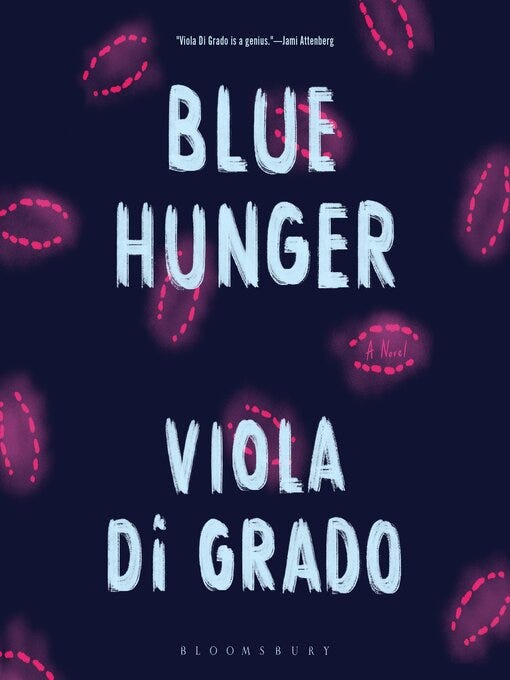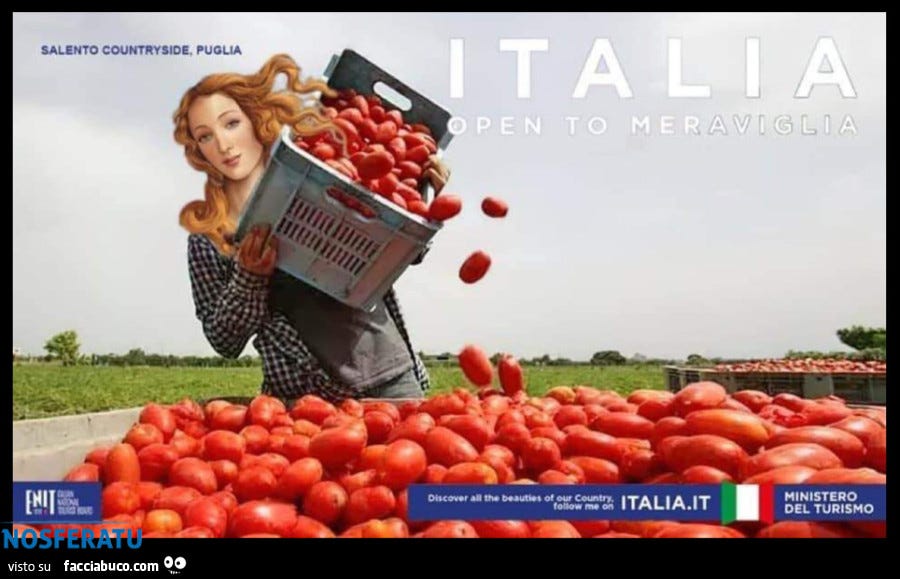Last week the Italian tourism ministry unveiled a new flagship campaign to attract visitors to the country. The result, the fruit of €9 million worth of work over several months, was… well, on the off-chance you haven’t seen it yet, I'll let you be the judge. The main character in the campaign is Botticelli's Venus; recast here as a 30-something-year-old ‘digital influencer’ [venereitalia23]. We follow “venereitalia23” through a series of snapshots: she tries on clothes in Milan, eats odd cardboard looking pizza in front of a Northern Lombardan lake, rides a bike by the Colloseum. And so on. Um, cool...? Of course, the idea of a youth-oriented campaign to draw attention to big events like the 2026 Cortina Winter Olympics and the 2030 Rome Expo isn’t in itself awful. It’s just that the half-arsed DIY animation, the snarky obnoxious voice acting and frivolousness of the whole approach also serves to alienate 95% of possible audiences. This, by the way, has been a widespread criticism. Implicit snobbery aside, I do agree with Dario Nardella, mayor of Florence, and others who have accused the campaign of being “painfully banal.” And, frankly, even if you disagree, there’s no denying they botched the job here. Not only did the German language version adopt translation software that literally translated place names [Brindisi = Toast apparently] some of the scenes, notably the wine drinking montage, were actually filmed in Slovenia to save money! Ideology? Whatever. Incompetence is the real headline in this instance [the horror begins at 1:34 - you have been warned].
In another own goal for the government, the new Ministry of Agriculture, Forests and “Food Sovereignty” (lol) doubled down this week on its campaign to discourage the sale of insects or their derivatives for commercialization as a foodstuff. Meloni’s administration has now formalised four decrees designed to prohibit the widespread sale of insect-based flours, on the basis that a) safety regulations are currently inadequate and b) insect flour is a threat to domestic culinary culture. Now, whatever you might think about eating insects on an aesthetic level – honestly, I’m not personally rushing to guzzle down a cricket – the policy is an error. For one thing, in ancient Italy, the Roman elite actually used to be overjoyed at the prospect of eating “beetle larvae reared on flour and wine,” at least according to Pliny the Elder. And even today, Italian chefs, like the team behind the glossy Entonote supper club in Milan, are making bold experiments as to how to utilize worms and beetles in interesting ways. Nevertheless - despite growing investment interest in the sector - government officials are now launching a full-scale culture war, suggesting the EU, the liberal snowflakes and shadowy mob of far left sexo-marxists are behind a great culinary conspiracy to sabotage the Italian way of life. The reality, of course, is that, at a global level, an estimated two billion humans already eat insects. And in a world of rapidly changing climate, when global food chains are in flux, Western nations, including Italy, will have to start opening their minds to that prospect too. Read Amy Kazmin at the FT for a more in-depth take.

Italy’s 25 April liberation day celebrations – which mark the victory against Nazi-fascism – have been even more peculiar than usual this year. For weeks and weeks the headlines have been filled with pretty much nothing else. From Meloni insisting that “fascism is no longer an acceptable reference point for today’s Italian right” at the precise moment that dozens of her ministers were organizing spurious business trips to avoid marking the resistance anniversary, to actually fully-fledged squadristi rallies in Verona, it’s been a bit of a pantomime. Of course, there’s no doubt the current administration is filled with fascist nostalgists. Just two weeks ago, Francesco Lollobrigida, the very same anti-insect-flour agriculture minister pictured above, made a casual reference to “ethnic substitution” during a speech. And while the newspapers widely condemned him, several of Meloni’s closest allies attacked that backlash as “political correctness gone mad”. While I obviously condemn those remarks, I do also think it’s clear that “25-april-ism”, as an -ism, is failing to serve the cause of resistance today. Survey after survey after survey shows that the Italian public is becoming less aware and less concerned than ever about the history of fascism. Despite the efforts of the communist nostalgists to monopolize the entire history of the resistance, as if it were only Marxists that fought against Mussolini’s forces, I’d therefore argue it’s far more important to spread the actual facts. This map, for example, which shows the Nazi-Fascist crimes that took place against civilian populations in 1943-45, never fails to send shivers down my spine. And I doubt even the most skilled of far-right rhetoricians could talk their way around this one.

Arts and culture: a shift in tone
It’s been a while - a long while actually - since I’ve come across any notable Italian book releases in English translation. I’m not sure what’s going on to be quite honest. Ferrante fatigue? A cut in budgets? A Meloni induced revulsion on the part of commissioning editors? Something else entirely? Whatever the answer, a friend this week alerted me to a novel that in their own words is a “sexy erotic postmodern horror”, which, if nothing else, had my ears pricking up. Blue Hunger by Viola di Grado tells the story of a young woman from Rome who, following the death of her twin, moves to Shanghai where she falls in love and lust with a man named Xu; the two quickly develop a sado-masochistic, perhaps quasi-cannibalistic sexual rapport while they embark on a journey of mutual interrogation of the unconscious mind. It is, as the blurb puts it, “visually stunning, taboo-demolishing journey into the depths of the psyche, from mourning to falling in lust-all in a city of potent dreams, stories, and stimulations.” This definitely sounds like it could go either way to me. But if you’re interested, here’s the link.
I couldn’t not end this week’s update without paying a little homage to the internet’s best efforts to mock the aforementioned tourism ministry campaign. I must say, Italy’s (mostly) young, bored, tech-wired, nerds, jokers and culture-hackers really excelled themselves here. From politically cutting shots of venereitalia23 picking tomatoes in southern slave-labour-conditions and taking a selfie by some overflowing bins to just plain trivial jokes, like photoshopping tourism minister Daniela Santanchè into Boticelli’s Venus’s seashell, or embossing the influencer protagonist onto Ryan Gosling’s T-Shirt from a Barbie Movie press event, I felt almost a smidgeon of hope about the collective intellect of this mad country I now call home. So feast your eyes on the below, and try not to give up on Italy just yet…
Recipe of the week: Tomato tonnato
I’m a huge and I mean a huge fan of Vitello tonnato. It’s probably one of my all-time favorite Italian entrees — certainly, my favourite traditional recipe from Piemonte’s decadent cuisine. That said, I admit, it is a bit much. ‘Boiled veal topped with a thick tuna mayo’ is still ‘boiled veal topped with a thick tuna mayo’ after it all. But it works! Trust me. If you’ve never tried vitello tonnato you must make the original; best served cold, thinly thinly sliced with a side salad. If on the other hand you’re a seasoned tonnato eater you might well be interested in this week’s recipe: a nifty little veg-forward take on the classic dish. Tomatoes, big ones. Thick and a little unripe are fine. Topped with the sauce. This is a trendy dish right now in all those millennial-run nuova trattorias in the northern metropolises. But it’s cheap, delicious and easy to prep at home. Helen Rosner has a recipe in the New Yorker that will help you prep-up some bistrot-style food, for a quarter of the price, right in your own kitchen. So what’s not to love?
About Me
My name is Jamie Mackay (@JacMackay) and I’m an author, editor and translator based in Florence. I’ve been writing about Italy for a decade for international media including The Guardian, The Economist, Frieze, and Art Review. I launched ‘The Week in Italy’ to share a more direct and regular overview of the debates and dilemmas, innovations and crises that sometimes pass under the radar of our overcrowded news feeds.
If you enjoyed this newsletter I hope you’ll consider becoming a supporter for EUR 5.00 per month (the price of a weekly catch-up over an espresso). Alternatively, if you’d like to send a one-off something, you can do so via PayPal using this link. No worries if you can’t chip-in or don’t feel like doing so, but please do consider forwarding this to a friend or two. It’s a big help!







